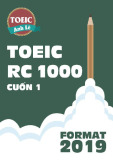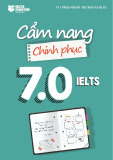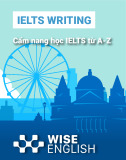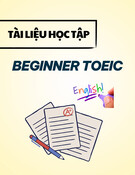
Basic Grammar in use ( Grammar )
Page 49
I. Định nghĩa
- Động từ khuyết thiếu là động từ nhưng lại không chỉ hành động mà nó chỉ giúp bổ nghĩa cho động từ
chính.
- Những động từ khuyết thiếu này có thể dùng chung cho tất cả các ngôi và không chia theo thì. Các
động từ theo sau động từ khuyết thiếu này được giữ nguyên thể.
- Các động từ khuyết thiếu thường dùng là: can, could, may, might, shall, should, will, would, must,
ought to, need, have to.
II. Cách dùng
1.
Modal verb + V1
Modal Verbs
Cách dùng
Ví dụ
Chú ý
Can
Diễn tả khả năng hiện
tại hoặc tương lai mà
một người có thể làm
được gì, hoặc một sự
việc có thể xảy ra.
- I can swim - Tôi có thể
bơi.
- It can rain - Trời có thể
mưa.
Can và Could còn được dùng
trong câu hỏi đề nghị/xin phép,
yêu cầu.
Ví dụ:
- Could you please wait a
moment? - Bạn có thể đợi một
lát được không?
- Can I sit here? - Tôi có thể ngồi
đây được không?
Could
Diễn tả khả năng xảy ra
trong quá khứ.
- My brother could speak
English when he was five -
Anh trai tôi đã có thể nói
tiếng Anh khi anh ấy 5
tuổi.
Must
Diễn đạt sự cần thiết,
bắt buộc ở hiện tại hoặc
tương lai.
Đưa ra lời khuyên hoặc
suy luận mang tính chắc
chắn, yêu cầu được
nhấn mạnh.
- You must get up early in
the morning - Bạn phải
dậy sớm vào buổi sáng.
- You must be tired after
work hard - Bạn chắc chắn
sẽ mệt sau khi làm việc
chăm chỉ.
- You must be here before
8 a.m - Bạn phải có mặt ở
đây trước 8 giờ.
Mustn't - chỉ sự cấm đoán
Ví dụ: You mustn't smoke here -
Bạn không được hút thuốc ở
đây.
Have to
Diễn tả sự cần thiết phải
làm gì nhưng là do
khách quan (nội quy,
quy định…).
I have to wear helmets
when driving a motorbike.
- Tôi phải đội mũ bảo hiểm
khi đi xe máy. (Luật quy
định như vậy)
Don't have to = Don't need to/
needn't (chỉ sự không cần thiết)
May
Diễn tả điều gì có thể
xảy ra ở hiện tại nhưng
không chắc.
It may be a bomb - Nó có
thể là một quả bom.
- May và might dùng để xin phép
nhưng có tính chất trang trọng
hơn can/ could. Nhưng might ít
được dùng trong văn nói, chủ
yếu trong câu gián tiếp:
- May I turn on TV?
- I wonder if he might go there
Might
Diễn tả điều gì có thể
xảy ra ở quá khứ.
Might được dùng không
phải là quá khứ của
- She might not be in his
house. - Cô ấy có lẽ không
ở nhà anh ta nữa.
- Where is John? I don't
Modal verbs (Động từ khiếm khuyết)

Basic Grammar in use ( Grammar )
Page 50
May.
know. He may/might go
out with his friends. - John
ở đâu rồi? - Tôi không biết.
Có lẽ anh ấy ra ngoài với
bạn.
alone.
Will
Diễn đạt, dự đoán sự
việc xảy ra trong tương
lai.
Đưa ra một quyết định
tại thời điểm nói.
- Tomorrow will be sunny.
- Ngày mai trời sẽ nắng.
- Did you buy sugar? Oh,
sorry. I'll go now. - Bạn có
mua đường không? - Ồ, xin
lỗi. Giờ mình sẽ đi mua.
Dùng Will hay Would trong câu
đề nghị, yêu cầu, lời mời.
Will you have a cup of coffee?
Would you like a cake?
Would
Diễn tả một giả định xảy
ra hoặc dự đoán sự việc
có thể xảy ra trong quá
khứ.
He was so tired. He would
get up late tomorrow -
Anh ấy rất mệt. Ngày mai,
chắc anh ấy sẽ dậy muộn.
Shall
Dùng để xin ý kiến, lời
khuyên. "Will" được sử
dụng nhiều hơn
Where shall we eat
tonight? - Tối nay chúng ta
ăn ở đâu?
Chỉ dùng với hai ngôi "I" và
“We”.
Should
Chỉ sự bắt buộc hay bổn
phận nhưng ở mức độ
nhẹ hơn "Must".
Đưa ra lời khuyên, ý
kiến.
Dùng để suy đoán.
- You should send this
report by 8th September.
- Bạn nên gửi báo cáo này
trước ngày 8 tháng Chín.
- You should call her.
- She worked hard, she
should get the best result.
- Cô ấy học rất chăm, cô ấy
sẽ đạt được kết quả cao
nhất
Ought to
Chỉ sự bắt buộc. Mạnh
hơn "Should" nhưng
chưa bằng "Must".
You ought not to eat candy
at night. - Bạn không nên
ăn kẹo vào buổi tối.

Basic Grammar in use ( Grammar )
Page 51
2.
Modal perfect ( khiếm khuyết hoàn thành ) : Modal + have + V3/ed
Một số cách biến đổi tương đương:
•
be necessary (for O) + to–V = need / have to
•
be unnecessary (for O) + to– V = don’t need / don’t have to
Ex: It is unnecessary for him to study many subjects.
He needn’t study many subjects
He does not have to study many subjects.
•
be possible / impossible + to-V = can/ cannot + V hoặc may/might
Ex: It is impossible for me to finish it now.
I can't finish it now
•
perhaps( có lẽ) = may/might
•
it’s better/it’s time …..= should
•
be not permited /be not allowed = mustn’t
MUST + HAVE + VP2: chỉ sự suy đoán logic dựa
trên những hiện tượng có thật ở quá khứ
Modal perfect
NEEDN’T + HAVE + VP2: chỉ những việc lẽ ra đã
không cần thiết phải làm nhưng đã làm.
MAY/ MIGHT + HAVE + VP2: chỉ những việc có
thể đã xảy ra nhưng không chắc chắn.
COULD + HAVE + VP2: chỉ những việc lẽ đã xảy
ra nhưng trên thực tế thì không
CAN’T + HAVE + VP2: chỉ những việc không thể
đã xảy ra vì có căn cứ, cơ sở rõ ràng
SHOULD + HAVE + VP2: chỉ một việc lẽ ra đã
phải xảy ra trong quá khứ nhưng vì lý do nào đó

Basic Grammar in use ( Grammar )
Page 52
PRACTICE EXERCISES
Exercise 1: Chọn phương án đúng
1.
You don't look well. You see a doctor.
A. could B. need to C. are to D. should
2.
She home yesterday because her little son was sick.
A. could have stayed B. must have stayed
C. had to stay D. should have stayed
3.
You disturb him during his work!
A. should not B. needn't C. mustn't D. don't have to
4.
Whose car is this? – It be Anton's. I think I saw him driving a red car like this one.
A. could B. might C. must D. would
5.
Though he was ill and weak, he get out of the burning building.
A. was able to B. might C. could D. should
6.
lending me your CD player for a couple of days?
A. Can you B. Would you mind C. Would you D. Could you
7.
The windows look clean. You wash them.
A. are not to B. needn't C. don't have to D. mustn't
8.
I don't believe it. It be true.
A. can't B. mustn't C. shouldn't D. wouldn't
9.
Young people obey their parents.
A. must B. may C. will D. ought to
10.
Jenny's engagement ring is enormous! It have cost a fortune.
A. must B. might C. will D. should
11.
You to write them today.
A. should B. must C. had D. ought
12.
" you hand me that pair of scissors, please?"
A. May B. Will C. Shall D. Should
13.
Jeanette did very badly on the exam. She harder.
A. must have studied B. could have studied
C. should have studied D. must studied
14.
Marcela didn't come to class yesterday. She an accident.
A. should have had B. must have
C. might have D. may have had
15.
John still hasn't come out. He everything for the trip now.
A. must have been preparing B. must be preparing
C. will be preparing D. will have prepared
16.
Thomas received a warning for speeding. He so fast.
A. shouldn't have driven B. should have
C. would have driven D. might have driven
17.
The photos are black. The X-ray at the airport them.
A. should have damaged B. would have damaged
C. would damage D. must have damaged
18.
Tom didn't do his homework, so the teacher became very angry. He his homework.
A. must have done B. should have done

Basic Grammar in use ( Grammar )
Page 53
C. might have D. will have done
19.
My car stopped on the high way. It out of gas.
A. may run B. must be
C. may have run D. should have run
20.
I be here by 6 o'clock? - No, you
A. Shall; mightn't B. Must; needn't C. Will; mayn't D. Might; won't
Exercise 2: Chọn phương án đúng
1. “Where do you think Rooney is today?". "I have no idea. He late."
A. should have left B. would sleep
C. would have sleep D. may have slept
2. Barbate painted his bedroom black. It looks dark and dreary. He a different color.
A. had to choose B. must have chosen
C. should have chosen D. could have been choosing
3. The children "thank you" to you when you gave them their gifts.
A. will have said B. should have said
C. must say D. should say
4. If we had known your new address, we to see you.
A. came B. will come C. would have come D. would come
5. These two boys look identical. They twins.
A. must have been B. should be C. must be D. should have been
6. You've been working non-stop for ten hours. You be really tired.
A. should B. must C. would rather D. ought to
7. The fortune teller predicted that inherit a big fortune before the end of this year.
A. will B. she will C. would D. she would
8. I'm feeling very tired this morning. I have stayed up late last night.
A. couldn't B. shouldn't C. mustn't D. to stopping
9. He helped her, but it was not necessary. He needn't her.
A. help B. to help C. be helping D. have helped
10. " you like to play a game of tennis?" "I'd love to."
A. Could B. Will C. Do D. Would
11. His letter is full of mistakes. He the mistakes carefully before sending it.
A. must have checked B. should have checked
C. could have checked D. can have checked
12. "I bought two bottles of milk." "You have bought milk; we have heaps of it in the
house."
A. couldn't B. needn't C. mustn't D. hadn't
13. When I first went to England, I English, but I it.
A. can read; can't speak B. can read; couldn't
speak
C. could read; couldn't speak D. could read; can't speak
14. The car plunged into the river. The driver out but the passengers were drowned.
A. is able to get B. could get C. was able to get D. can get
15. I got lost and ask a policeman the way.
A. have to B. must have to C. had to D. would
16. We have some days off after the exam spend some time together?
A. Let B. Shall I C. Shall we D. Would you like

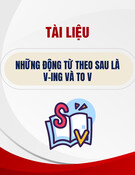

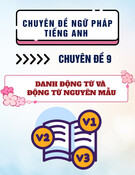


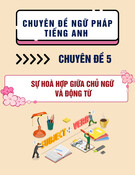

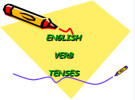


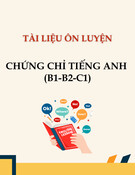
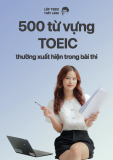
![Tài liệu luyện thi TOEIC cấp tốc trong 10 ngày [chuẩn nhất]](https://cdn.tailieu.vn/images/document/thumbnail/2025/20251029/kimphuong1001/135x160/99661761725822.jpg)
![Tài liệu Phá đảo TOEIC 900+ từ mất gốc trong 30 ngày [Mới nhất]](https://cdn.tailieu.vn/images/document/thumbnail/2025/20251029/kimphuong1001/135x160/2101761720956.jpg)
